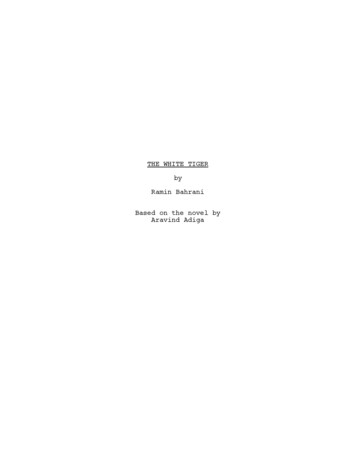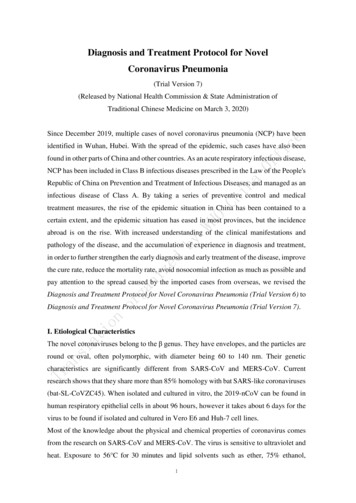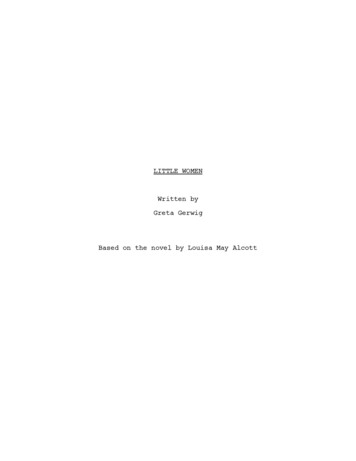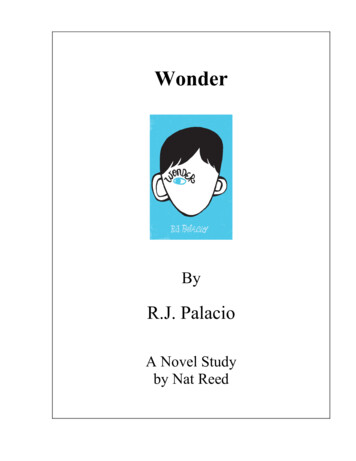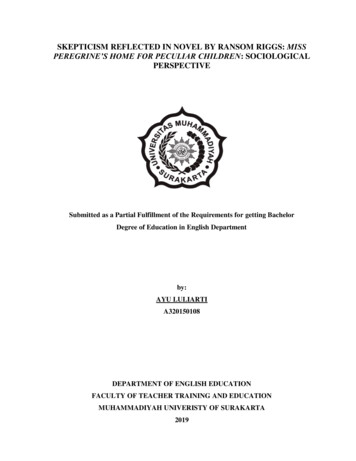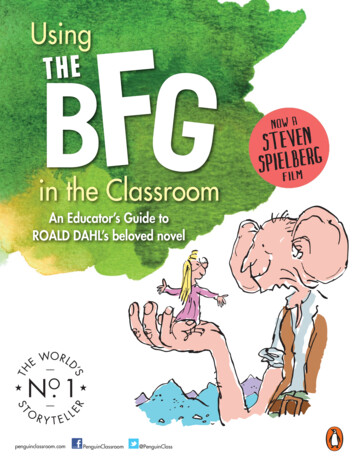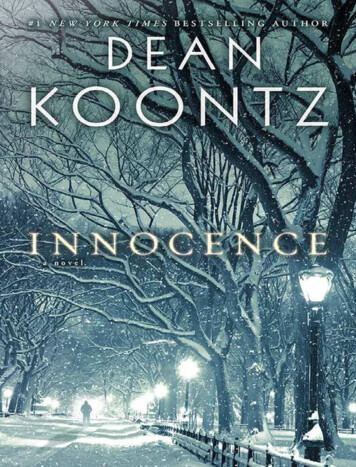
Transcription
Innoce nce is a work of fiction. Names, characters, p laces, and incidents arethe p roducts of the author’s imagination or are used fictitiously. Anyresemblance to actual events, locales, or p ersons, living or dead, is entirelycoincidental.Cop yright 2 014 by Dean KoontzAll rights reserved.Published in the United States by Bantam Books, an imp rint of The RandomHouse Publishing Group , a division of Random House LLC, a PenguinRandom House Comp any, New York.A signed, limited edition has been p rivately p rinted by Charnel House.Charnelhouse.comTitle p age art from an original p hotograp hby Agne KveselyteBANTAM BOOKS and the HOUSE colop hon are registered trademarks ofRandom House LLC.LIBRARY OF CONGRESS CATALOGING-IN-PUBLICATION DATAKoontz, Dean R. (Dean Ray)Innocence : a novel / Dean Koontz.p ages cmISBN 978 -0-553-8 08 03-2 (acid-free p ap er)—ISBN 978 -0-345-53965-6 (eBook)1. Social isolation—Fiction. I. Title.PS3561.O55155 2 0138 13′.54—dc2 32 013014516
www.bantamdell.comJacket design: Scott BielJacket p hoto: Pawel Gaul/E /Getty Imagesv3.1
Rarely do great beauty and great virtue dwell together.—PETRARCH, DE REMEDIIS
ContentsCove rTitle Pag eCopyrig htEpig raphPart One: The Girl I Met in Lamplight Near CharlesDickensChap terChap terChap terChap terChap terChap terChap terChap terChap terChap terChap terChap terChap terChap terChap terChap terChap terChap terChap terChap terChap terChap ter12345678910111213141516171819202122
Chap terChap terChap terChap terChap terChap terChap terChap terChap terChap ter23242526272829303132Part Two: The Flame Delights the Moth Before theChap terChap terChap terChap terChap terChap terChap terChap terChap terChap terChap terChap terChap terChap terChap terChap terChap terChap terChap terChap ter3334353637383940414243444546474849505152Wings Burn
Part Three: What Might Have Been and What Has BeenChap terChap terChap terChap terChap terChap terChap terChap terChap terChap terChap terChap terChap terChap terChap terChap terChap terChap terChap terChap terChap terChap terChap terChap terChap terChap terChap terChap terChap terChap terChap terChap terChap terChap 677787980818283848586
De dicationOthe r Books by This AuthorAbout the Author
1HAVING ESCAPED ONE FIRE, I EXPECTED ANOTHER. I didn’t viewwith fright the ames to come. Fire was but light andheat. Throughout our lives, each of us needs warmth andseeks light. I couldn’t dread what I needed and sought. Forme, being set a re was merely the expectation of aninevitable conclusion. This fair world, compounded ofuncountable beauties and enchantments and graces,inspired in me only one abiding fear, which was that Imight live in it too long.
2I WAS CAPABLE OF LOVE, BUT I LIVED IN SOLITUDE after Fatherdied. Therefore I loved only the precious dead, and books,and the moments of great beauty with which the citysurprised me from time to time, as I passed through it inutmost secrecy.For instance, sometimes on clear nights, in the solemnhour when most of the population sleeps, when thecleaning crews are nished and the high-rises darkle untildawn, the stars come out. They are not as bright over thismetropolis as they must be over a Kansas plain or aColorado mountain, but they still shine as if there is a cityin the sky, an enchanting place where I could walk thestreets with no fear of re, where I could nd someone tolove, who would love me.Here, when I was seen, my capacity for love earned meno mercy. Quite the opposite. When they saw me, men andwomen alike recoiled, but their fear quickly gave way tofury. I would not harm them to defend myself, and Iremained therefore defenseless.
3ON CERTAIN NIGHTS, BEAUTIFUL BUT SAD MUSIC found its wayinto my deep windowless rooms. I didn’t know fromwhere it came, and I couldn’t identify the tune. No lyricsaccompanied the melody, but I remained convinced that Ihad once heard a smoky-voiced chanteuse sing this song.Each time the song came, my mouth moved as if formingthe words, but they eluded me.The piece was not a blues number, yet it weighed on theheart as did the blues. I might call it a nocturne, althoughI believe that a nocturne is always an instrumental. Wordsexisted to this melody. I was certain they did.I should have been able to follow those melli uousstrains to a vent grille or a drain, or to some other routeof transmission, but every attempt to seek the sourceended in failure. The music seemed to issue from the air,as if passing through a membrane from another, unseenworld parallel to ours.Perhaps those who lived in the open would have foundthe idea of an invisible world too fanciful and would havedismissed the notion.Those of us who remain hidden from everyone else,however, know that this world is wondrous and filled withmysteries. We possess no magical perception, no psychicinsight. I believe our recognition of reality’s complexdimensions is a consequence of our solitude.To live in the city of crowds and tra c and constantnoise, to be always striving, to be in the ceaseless
competition for money and status and power, perhapsdistracted the mind until it could no longer see—andforgot—the all that is. Or maybe, because of the pace andpressure of that life, sanity depended on blinding oneselfto the manifold miracles, astonishments, wonders, andenigmas that comprised the true world.When I said “those of us who remain hidden,” I shouldinstead have said “I who am hidden.” As far as I wasaware, no other like me existed in that metropolis. I hadlived alone for a long time.For twelve years, I shared this deep redoubt withFather. He died six years earlier. I loved him. I missed himevery day. I was now twenty-six, with perhaps a long,lonely life ahead of me.Before I arrived, my father lived here with his father,whom I never had the honor of meeting. Most of thefurnishings and books were handed down to me fromthem.One day perhaps I would pass my belongings tosomeone who might call me Father. We were an enduringdynasty of the dispossessed, living in the secret city thatthe city’s people never saw.My name is Addison. But back then we needed nonames because we spoke to no one but each other.Sometimes, with a smile, Father called himself It. Butthat wasn’t a real name. He called me Its It, or Son of It,which was our little joke.By the standards of humanity, we were exceedingly uglyin a way that excited in them abhorrence and the mostterrible rage. Although we were as much human as those
who lived in the open, we did not wish to o end, and sowe hid ourselves away.Father told me that our kind must not be angry withother men and women merely because of the way thatthey treated us. They had anxieties we could neverunderstand. He said that we of the hidden had ourburdens, but those who lived in the open carried farheavier burdens than ours, which was true.We also remained hidden to avoid worse thanpersecution. One night, my father was caught in the open.Two frightened, enraged men shot and clubbed him todeath.I did not harbor any anger toward them. I pitied them,but I loved them as best I could. We have all been broughtinto the world for some reason, and we must wonder whyand hope to learn.My little windowless residence also served as myschool, where I sought to learn, and the most important ofthose three small rooms was the one lined with mahoganyshelves built by my father’s father. The shelves were lledwith books not wanted by those who lived in the worldabove.Each of the deep, comfortable armchairs had a paddedfootstool. Beside each chair stood a simple wooden cubeon which to set a drink, and a bronze oor lamp with apleated shade of peach-colored shantung silk.A small table and two straight-backed chairs provided aplace to dine. In the days when we were two, we playedcards and chess at that table.These days, I occasionally played solitaire. I didn’t
much like the game, but sometimes, shu ing the cards ordealing them out, I saw not my hands but instead myfather’s. His ngers were deformed because they hadhealed improperly in self-applied splints after a ministerhad broken them on a Sunday night, when Father was aboy.I loved those hands, which never harmed a living thing.The pale scars and arthritic knuckles were beautifulbecause they signi ed his courage and reminded me that Imust never be embittered by the cruelties in icted on us.He su ered more than I did, and yet he loved life and theworld.The table and most of the other furnishings had beenbrought here with di culty or had been built in place bythose who came before me.For six years, I had not needed two armchairs. Most ofthe time, when reading, I sat in the chair that had beenmine since I arrived there. Once in a while, however, I satin Father’s chair, the better to remember him and to feelless alone.The second room, like the others, was eight feet high.The thick walls, oor, and ceiling were of steel-reinforcedconcrete through which vibrations sometimes traveled butnever any identi able sounds other than theaforementioned music.To each side of the doorless doorway, a hammock wassuspended wall to wall. The canvas was easy to spongeclean, and my blanket was the only bedding to belaundered.When Father still lived, on nights when sleep eluded us,
we would lie awake, either in the dark or in candlelight,and talk for hours. We conversed about what little of theworld we’d seen rsthand, about the marvels of naturethat we studied in books of color photography, and aboutwhat all of it might mean.Perhaps those were among my happiest memories,although I had so many that were happy, I wasn’t easilyable to favor some over others.Against the back wall, between hammocks, stood arefrigerator. Father’s father had once lived without thisamenity. My father—an autodidact like me—taughthimself to be ane electrician and an appliancemechanic. He dismantled the refrigerator, brought it downfrom the world aboveground, and reassembled it.To the left of the refrigerator stood a table holding atoaster oven, a hot plate, and a Crock-Pot. To the rightwere open shelves that served as my larder and tablewarestorage.I ate well and remained grateful that the city was aplace of plenty.When Father’s father discovered this deep redoubt,electricity and a minimum of plumbing were alreadyprovided, although the rooms were unfurnished. Noevidence existed to suggest that they had ever previouslybeen occupied.Before Father found me alone and waiting to be killed,he and his father imagined many explanations for thesechambers.One might think this place must be a bomb shelter, sodeep beneath the street, under so many thick layers of
concrete, that multiple nuclear blasts would not crack itopen, reached by such a circuitous route that deadlyradiation, which traveled in straight lines, could not ndits way here.But when you removed the receptacles from theirmounting screws in any wall outlet, the manufacturer’sname stamped in the metal junction box identi ed acompany that, research proved, went out of business in1933, long before a nuclear threat existed.Besides, a bomb shelter for only two, in a great city ofmillions, made no sense.The third room, a bath, also concrete all around, wasnot designed with the expectation that the city and itsutilities would be atomized. The pedestal sink and theclaw-foot tub o ered two spigots each, although the hotwater was never more than pleasantly warm, suggestingthat whatever boiler it tapped must have been far fromthere. The old toilet featured an overhead tank thatflushed the bowl when you pulled on a hanging chain.During construction, perhaps some o cial who wasalso a sexual predator with homicidal desires might haveprovided for this sanctum under one pretense or another,intending later to erase its existence from all publicrecords, so that he could by force bring women to aprivate dungeon to torture and murder them, while theteeming city overhead remained unaware of the screamingfar below.But neither a city engineer nor an architect of publicutility pathways seemed likely to be an insatiable serialkiller. And when Father’s father discovered these cozy
quarters back in the day, no gruesome stains or otherevidence of murder marred the smooth concrete surfaces.Anyway, these rooms had no ominous quality aboutthem.To those who lived in the open, the lack of windowsand the bare concrete might call to mind a dungeon. Butthat perception was based on the assumption that theirway of life was not merely superior to ours but alsowithout a viable alternative.Every time that I left this haven, as I did for manyreasons, my life was at risk. Therefore, I had developed amost keen sense of pending threat. No threat existed here.This was home.I favored a theory involving the unseen world parallelto ours that I mentioned earlier. If such a place existed,separated from us by a membrane we couldn’t detect withour ve senses, then perhaps at some points along thecontinuum, the membrane bulged around a small part ofthat other reality and folded it into the stu of ours. Andif both worlds, in their becoming, arose from the sameloving source, I liked to believe that such secret havens asthis would be provided especially for those who, like me,were outcasts by no fault of their own, reviled andhunted, and in desperate need of shelter.That was the only theory I wished to accommodate. Icouldn’t change what I was, couldn’t become moreappealing to those who would recoil from me, couldn’tlead any life but the one to which my nature condemnedme. My theory gave me comfort. If one less reassuringrevealed itself, I would refuse to consider it. So much in
my life was beautiful that I wouldn’t risk pondering anydarkening idea that might poison my mind and rob me ofmy stubborn joy.I never went into the open in daylight, nor even at dusk.With rare exception, I ascended only after midnight, whenmost people were asleep and others were awake butdreaming.Black walking shoes, dark jeans, and a bla
Koontz, Dean R. (Dean Ray) Innocence : a novel / Dean Koontz. pages cm ISBN 978-0-553-80803-2 (acid-free paper)— ISBN 978-0-345-53965-6 (eBook) 1. Social isolation—Fiction. I. Title. PS3561.O55155 2013 813′.54—dc23 2013014516. www.bantamdell.com Jacket design: Scott Biel Jacket photo: Pawel Gaul/E /Getty Images v3.1. Rarely do great beauty and great virtue dwell together. —PETRARCH .

